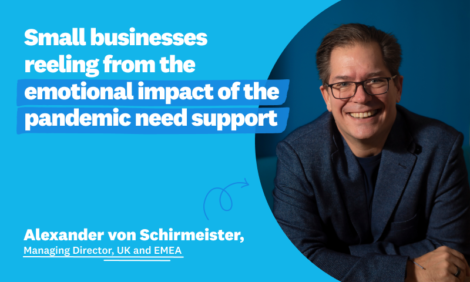
Small businesses reeling from the emotional impact of the pandemic need support

The shops are open, the high street is buzzing, and the pubs, bars and restaurants are filled once again with happy customers. Make no mistake, this is good news. Signs of economic recovery – tempered by the cost of living crisis and other pressing challenges – are at least offering green shoots of hope.
But the pandemic isn’t over. From lateral flow tests the morning of a big meeting, to the heightened awareness of every cough or sore throat, to the number of masked faces in the supermarket, we’re still dealing with its impact every day.
Our recent study has found that UK small business owners are still coping with the emotional impact of the pandemic, suffering a mental health hangover after two years of unprecedented disruption.
It also highlighted the significant benefits of small businesses being able to embrace mental health initiatives, from being more likely to hold on to staff to growing revenues.
Here, we dive into some of the findings of this report, and how support can be provided to those still struggling with this under-reported aspect of recovery.
Mental health hangover
Our study discovered two out of five UK small business owners (40%) believe their business will recover financially before they recover emotionally and mentally from the pandemic. This is a staggering figure, given the sheer scale of the economic impact of the past two years.
And considering the challenges posed by the pandemic and multiple lockdowns, it’s no surprise that the vast majority (nine in 10) of small business owners have suffered at least one symptom of poor mental health during this period.
Sadly, for many, the business itself has been a cause of distress. 52% of respondents said that running their business contributed in some way to symptoms of poor mental health over the last two years.
These worrying figures shine a harsh light on the pandemic’s impact, and the struggle many small business owners face in looking after their own wellbeing.
Pressure points
The events of the last two years increased pressure on small business owners attempting to run a healthy business. But they also placed a strain on their ability to take the time to cope with the growing emotional burden.
Three quarters (75%) of respondents either hadn’t taken a single sick day or didn’t feel they had the option to take one, while on average respondents have taken just over one day each over the last two years.
This is a horrible position to be in – fighting tooth and nail to keep your labour of love afloat, while being unable to take the time to rest, recover and reduce stress.
Meanwhile, many owners felt the level of external help fell short, too, with only around half (55%) knowing where to turn to get mental health support.
What’s clear, too, is that the ability to invest in mental health has significant benefits for small businesses. More than half (53%) saw increased productivity following the introduction of mental health support.
What’s next?
Put simply: small business owners need our help. Not only to ensure they have the capacity to look after their own wellbeing, but to embrace and support mental health initiatives throughout their businesses.
This is why we have created our mental health toolkit, in partnership with mental health platform Unmind. It’s a dedicated resource providing small business owners vital tips and tricks around wellbeing, while sharing advice from others who have faced mental health challenges. The toolkit also offers a wealth of external resources that can be accessed for those who are struggling.
While we understand post-pandemic emotional recovery will be a long journey, and one that requires constant support and care, we hope that small business owners can look to the future with a degree of optimism, both for their businesses, and their personal wellbeing.
The post Small businesses reeling from the emotional impact of the pandemic need support appeared first on Xero Blog.
Source: Xero Blog






